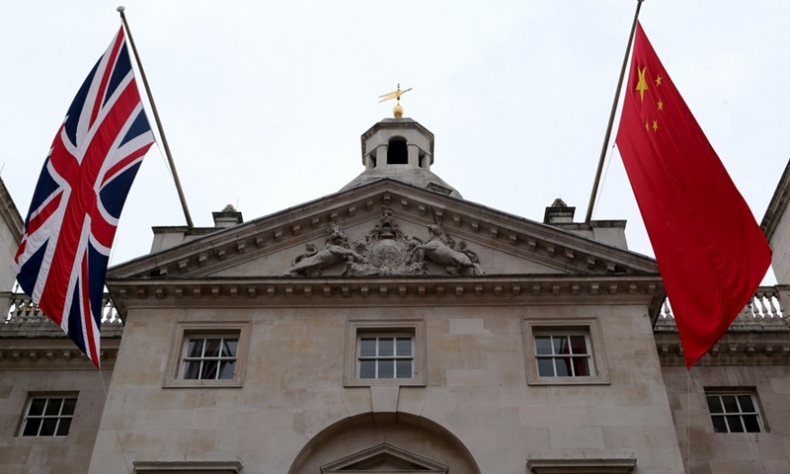The Future of UK-China Relations

At a time when the British economy has shrunk by 20% during the COVID-19 crisis, it is not wise to sign up fully to the new U.S.-led Cold War against China.
As relations between the U.K. and China continue to cool, two countervailing forces are competing to influence their future direction.
The lobby making the most noise is that calling for yet more punitive action against the Chinese government and Chinese enterprises, reinforced by sanctions.
Urged on by U.S. Secretary of State Mike Pompeo and Washington’s China hawks, they claim to be motivated by concerns about national security, human rights, peace and fair trade.
The reality in most cases is more ideological and political. On his recent visit to Britain, Pompeo made no secret of his hostility to China’s fundamentally socialist system and Communist Party rule: Chinese power must be “contained” within the Far East and its economic involvement rolled back in Europe, Africa and rest of Asia. Chinese society must be “reformed” in order to break the power of the CPC, dismantle and privatize its economic system and open it up wholesale to Western capitalist monopolies.
The Labour Party leadership and many Labour MPs have varying degrees of sympathy with this agenda. But their prime motivation at present is to present themselves as firmer, more consistent champions of human rights than Prime Minister Boris Johnson.
Thus, the anti-China lobby is diverse, wide-ranging and influential.
Yet there are powerful forces which do not want to undo all the progress made in U.K.-China relations over the past decade or so. When former Chancellor of the Exchequer George Osborne hailed a “new golden age” in that relationship back in 2015, he was speaking for substantial elements in the British capitalist class.
Some of these are raising their voices against today’s China-bashing, albeit sotto-voce. They understand the benefits that flow to Britain — and not only to the wealthiest owners of capital — from trade and investment links. The more far-sighted of them also recognize how substantial the mutual benefits could be in the future as China has become world’s second largest economy.
Already, China is Britain’s third biggest trading partner, after taking into account the “Rotterdam effect” which exaggerates Britain’s trade with the Netherlands. The Chinese mainland is now Britain’s fifth biggest export market, and rising. Major exports include petrol and petrol products, road vehicles, medicine, pharmaceuticals, power generating and electrical machinery, and scientific instruments. British-supplied financial and education services help narrow the trade deficit.
Britain could export much more were it not for restrictions — demanded by the U.S. Back in 2006, Chinese trade officials in Beijing told me that they would like more mechanical equipment, environmental and financial technology, energy conservation products and electronic control systems from Britain, as well as more wine, tobacco and “luxury” goods.
Germany’s stronger engineering, chemicals and manufacturing base — together with a less supine attitude to U.S. restrictions — ensures a level of exports to China four times that of Britain.
Nonetheless, British companies have expanded their involvement in China substantially in recent years. Jaguar Land Rover, AstraZeneca (pharmaceuticals), drinks producer Diageo, Unilever, BT, Rio Tinto as well as banks, insurance firms and hotel chains have established themselves on the Chinese mainland. They are helped by the opening-up of the financial sector and by January’s foreign investment law to ease restrictions and create a more level playing field for international enterprises.
In the other direction, China has become an important new source for investment in Britain’s industries largely abandoned by a British capitalist class which seeks higher profits elsewhere.
China now owns the ninth biggest stock of foreign direct investment in the British domestic economy. Chinese companies employ around 71,000 workers in Britain, two-thirds of which operate in the industrial sector, representing a very small but growing share of the productive economy.
The Conservative government’s recent decision to end Huawei’s involvement in Britain’s 5G digital network is likely to prove costly in more ways than one. Even the minister responsible, Culture Secretary Oliver Dowden, admits that it will delay the roll-out by up to three years. A recent study adds that this will cost the economy almost £7 billion (around $9.1 billion), as Britain falls behind Europe, and small towns and rural areas are hit hardest.
The question now is whether anti-China Conservative and Labour MPs force the government to take further action against Chinese companies investing in Britain.
At a time when the British economy has shrunk by 20% during the COVID-19 crisis, it is not wise to sign up fully to the new U.S.-led Cold War against China.
More companies and trade unions now need to speak up for Britain’s mutually beneficial links with China in order to prevent that happening.
Robert Griffiths is a former Senior Lecturer in Political Economy and History at the University of Wales and currently the General Secretary of the Communist Party of Britain.
 Facebook
Facebook
 Twitter
Twitter
 Linkedin
Linkedin
 Google +
Google +










